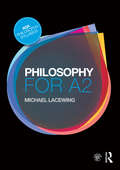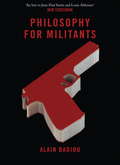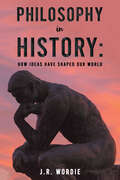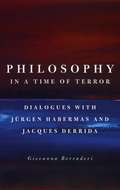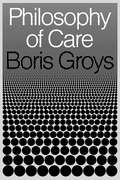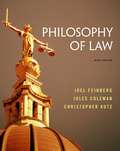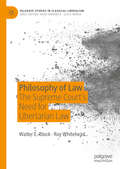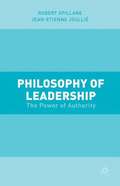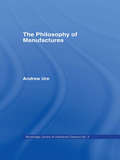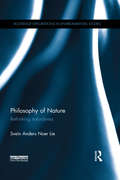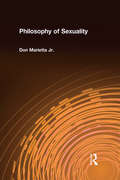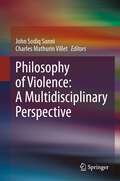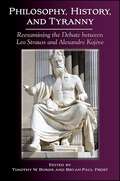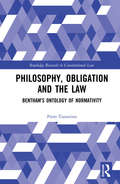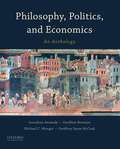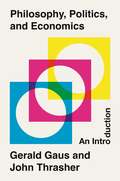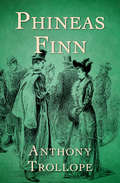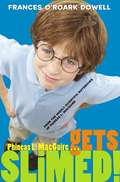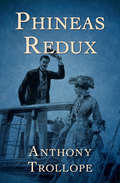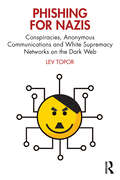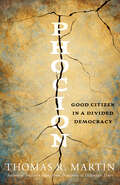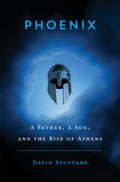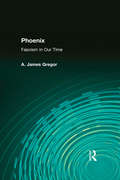- Table View
- List View
Philosophy for A2: Ethics and Philosophy of Mind
by Michael LacewingPhilosophy for A2 is an engaging textbook for the new AQA A2 Philosophy syllabus. Structured closely around the AQA specification this textbook covers the two units, Ethics and Philosophy of Mind, in a comprehensive and student-friendly way. All of the anthology texts are explained and commented on and woven into the discussion of the syllabus. With chapters on 'How to Do Philosophy' and exam preparation this textbook provides students with the philosophical skills they need to succeed. Each chapter includes: explanation and commentary of the AQA anthology texts comprehension questions to test understanding discussion questions to generate evaluative argument 'going further' sections for advanced study cross-references to help students make connections bullet-point summaries of each topic. The companion website hosts a wealth of further resources, including PowerPoint slides, flashcards, further reading, weblinks and handouts, all structured to accompany the textbook. It can be found at www.routledge.com/cw/alevelphilosophy.
Philosophy for Militants
by Bruno Bosteels Alain BadiouAn urgent and provocative account of the modern 'militant', a transformative figure at the front line of emancipatory politics. Around the world, recent events have seen the creation of a radical phalanx comprising students, the young, workers and immigrants. It is Badiou's contention that the politics of such militants should condition the tasks of philosophy, even as philosophy clarifies the truth of our political condition.To resolve the conflicts between politics, philosophy and democracy, Badiou argues for a resurgent communism - returning to the original call for universal emancipation and organizing for militant struggle.
Philosophy in History: How Ideas Have Shaped Our World
by J. R. WordieWhat kind of forces have shaped our modern world? Have they been political, economic, scientific, or perhaps even theological? The answer is that all of these forces have been at work, but they have all been the product of ideas, as our views on all of these topics have changed over time. Can ideas be more powerful than armies? Surprisingly, the answer is ‘yes’. History teaches us that nothing is more powerful than an idea whose time has come. Throughout history, rulers, generals and in our own day even stockbrokers and plutocrats have always imagined themselves to be in charge, with that last group even describing themselves as ‘masters of the universe’. In reality, however, all of these individuals have themselves been the products of ideas, owing their positions entirely to existing trends of thought. How this has come about and how it has delivered for us our present-day world are the themes explained in this book.
Philosophy in a Time of Terror: Dialogues with Jurgen Habermas and Jacques Derrida
by Giovanna BorradoriThe idea for Philosophy in a Time of Terror was born hours after the attacks on 9/11 and was realized just weeks later when Giovanna Borradori sat down with Jürgen Habermas and Jacques Derrida in New York City, in separate interviews, to evaluate the significance of the most destructive terrorist act ever perpetrated. This book marks an unprecedented encounter between two of the most influential thinkers of our age as here, for the first time, Habermas and Derrida overcome their mutual antagonism and agree to appear side by side. As the two philosophers disassemble and reassemble what we think we know about terrorism, they break from the familiar social and political rhetoric increasingly polarized between good and evil. In this process, we watch two of the greatest intellects of the century at work.
Philosophy in a Time of Terror: Dialogues with Jürgen Habermas and Jacques Derrida
by Giovanna BorradoriThe idea for "Philosophy in a Time of Terror" was born hours after the attacks on 9/11 and was realized just weeks later when Giovanna Borradori sat down with Jurgen Habermas and Jacques Derrida in New York City, in separate interviews, to evaluate the significance of the most destructive terrorist act ever perpetrated. This book marks an unprecedented encounter between two of the most influential thinkers of our age as here, for the first time, Habermas and Derrida overcome their mutual antagonism and agree to appear side by side. As the two philosophers disassemble and reassemble what we think we know about terrorism, they break from the familiar social and political rhetoric increasingly polarized between good and evil. In this process, we watch two of the greatest intellects of the century at work. "
Philosophy of Care
by Boris GroysRetracing the philosophical discussions around careOur current culture is dominated by the ideology of creativity. One is supposed to create the new and not to care about the things as they are. This ideology legitimises the domination of the &“creative class&” over the rest of the population that is predominantly occupied by forms of care – medical care, child care, agriculture, industrial maintenance and so on. We have a responsibility to care for our own bodies, but here again our culture tends to thematize the bodies of desire and to ignore the bodies of care – ill bodies in need of self-care and social care.But the discussion of care has a long philosophical tradition. The book retraces some episodes of this tradition - beginning with Plato and ending with Alexander Bogdanov through Hegel, Heidegger, Bataille and many others. The central question discussed is: who should be the subject of care? Should I care for myself or trust the others, the system, the institutions? Here, the concept of the self-care becomes a revolutionary principle that confronts the individual with the dominating mechanisms of control.
Philosophy of Law
by Jules Coleman Christopher Kutz Joel FeinbergThis leading anthology contains essays and cases written by some of the most influential figures in legal philosophy, representing the major theoretical positions in the field. Its primary focus is to relate traditional themes of legal philosophy to the concerns of modern society in a way that invigorates the former and illuminates the latter. This classic text is distinguished by its clarity and accessibility, balance of topics, balance of positions on controversial questions, topical relevance, imaginative use of cases and stories, and the inclusion of only lightly edited or untouched legal classics. This revision is distinguished by its inclusion of new material on law and economics, international law, distributive justice, religion and freedom of expression, feminist legal theory, and critical race theory, as well as a greater emphasis on concrete legal problems.
Philosophy of Law: The Supreme Court’s Need for Libertarian Law (Palgrave Studies in Classical Liberalism)
by Walter E. Block Roy WhiteheadLooking at discrimination, education, environment, health and crime, this volume analyses United States Supreme Court rulings on several legal issues and proposed libertarian solutions to each problem. Setting their own liberal theory of law, each chapter discusses the law at hand, what it should be, and what it would be if their political economic philosophy were the justification of the legal practice. Covering issues such as sexual harassment, religion, markets in human organs, drug prohibition and abortion, this book is a timely contribution to classical liberal debate on law and economics.
Philosophy of Leadership: The Power of Authority
by Jean-Etienne Joullié Robert SpillanePhilosophy of Leadership.
Philosophy of Manufactures: Or, An Exposition Of The Scientific, Moral, And Commercial Economy Of The Factory System Of Great Britain
by Andrew UreAndrew Ure (1778-1857) was a professor at the University of Glasgow and an enthusiast for the Industrial Revolution’s new systems of manufacturing. As we know, a consequence of these new developments was the redundancy of many workers, just as we are experiencing today with ‘downsizing’ and ‘reengineering’. This study details the creation of the general education system as an answer to the need for less self-willed and intractable workmen, which were unfit to become "components of a mechanical system". In our times of permanent technological revolution, this is an excellent insight into the roots of industrial progress. Understanding rural workers' shock and their need to readapt to a new urban, factorial reality, and the white collar workers’ dilemma of social security or entrepreneurship is achieved by this fascinating and important book.
Philosophy of Nature: Rethinking naturalness (Routledge Explorations in Environmental Studies)
by Svein Anders LieThe concept of naturalness has largely disappeared from the academic discourse in general but also the particular field of environmental studies. This book is about naturalness in general – about why the idea of naturalness has been abandoned in modern academic discourse, why it is important to explicitly re-establish some meaning for the concept and what that meaning ought to be. Arguing that naturalness can and should be understood in light of a dispositional ontology, the book offers a point of view where the gap between instrumental and ethical perspectives can be bridged. Reaching a new foundation for the concept of ‘naturalness’ and its viability will help raise and inform further discussions within environmental philosophy and issues occurring in the crossroads between science, technology and society. This topical book will be of great interest to researchers and students in Environmental Studies, Environmental Philosophy, Science and Technology Studies, Conservation Studies as well as all those generally engaged in debates about the place of ‘man in nature’.
Philosophy of Sexuality
by Don Marietta, Jr.This text offers a broad range of topics relating to the philosophy of sexuality. These include: morality; adultery; sex and gender differences; romantic love; gender-based speech; marriage; family and parenthood; feminism; and others.
Philosophy of Violence: A Multidisciplinary Perspective
by John Sodiq Sanni Charles Mathurin VilletThis volume explores the role of violence generally but with specific reference to African concepts and themes, and the significance they have for social redress. The contributors interpret African concepts and themes to include accounts of violence, explicitly or implicitly construed from indigenous axiological resources like Ubuntu or personhood and from those works that are not African in origin but have become central in African moral, political and legal thought, such as Hannah Arendt’s On Violence and Walter Benjamin’s Critique of Violence. The volume contributes to moral philosophy, social philosophy, African philosophy, and political philosophy/theory. It situates itself within the Global South, specifically the African perspective, to explore, articulate, and defend (or even critique) African conceptions of violence. This volume also takes seriously the need to tap into the intellectual resource of the African and diasporic African episteme thruthinkers such as Steve Biko, Frantz Fanon and Reiland Rabaka. It appeals to students and researchers working in philosophy and related disciplines on violence in Africa and the postcolonial context.
Philosophy, History, and Tyranny: Reexamining the Debate between Leo Strauss and Alexandre Kojève (SUNY series in the Thought and Legacy of Leo Strauss)
by Timothy W. Burns; Bryan-Paul FrostOn Tyranny remains a perennial favorite, possessing a timelessness that few philosophical or scholarly debates have ever achieved. On one hand, On Tyranny is the first book-length work in Leo Strauss's extended study of Xenophon, and his "Restatement" retains a vivacity and directness that is sometimes absent in his later works. On the other, "Tyranny and Wisdom" is perhaps the most succinct yet fullest articulation of Alexandre Kojève's overall political thought, and it presents what may be the most uncompromising alternative to Strauss's position as a whole. This volume contains for the first time a comprehensive and critical examination of the debate from scholars well versed in the thought of Strauss, Kojève, Hegel, Heidegger, and the end of history thesis. Of particular interest will be the appendix, which offers for the first time Kojève's unabridged response to Strauss, a response previously available only from the Fonds Kojève at Le Bibliothèque Nationale de France. Accessible to students and scholars alike, this volume works equally well in the classroom and as a resource for more advanced research.
Philosophy, Obligation and the Law: Bentham’s Ontology of Normativity (Routledge Research in Constitutional Law)
by Piero TarantinoThis book presents a comprehensive investigation of the notion of obligation in Bentham’s thought. For Bentham, obligation is a fictitious – namely linguistic – entity, whose import and truth lie in empirical perceptions of pain and pleasure, ‘real’ entities. This work explores Bentham’s fictionalism, and aims to identify the general features that ethical fictitious entities (including obligation) share with other kinds of fictitious entities. The book is divided into two parts: the first examines the ontological and epistemological foundations of Bentham’s distinction between real and fictitious entities; the second part addresses the normative and motivational aspects of moral and legal notions. This book reveals the centrality of the following issues to Bentham’s legal reform: logic, theory of language, physics, metaphysics, metaethics, axiology, moral psychology, the structure of practical reasoning and action with reference to the law.
Philosophy, Politics, And Economics: An Anthology
by Michael C. Munger Jonathan Anomaly Geoffrey Brennan Geoffrey Sayre-MccordThe only book on the market to include classical and contemporary readings from key authors in Philosophy, Politics, and Economics (PPE), this unique anthology provides a comprehensive overview of the central topics in this rapidly expanding field. Each chapter opens with an introduction that helps students understand the central arguments and key concepts in the readings. The selections encourage students to think about the extent to which the three disciplines offer complementary or contradictory ways of approaching the relevant issues. Philosophy, Politics, and Economics: An Anthology is ideal for undergraduate PPE programs and courses in political philosophy and political economy.
Philosophy, Politics, and Economics: An Introduction
by Gerald Gaus John ThrasherAn updated and expanded edition of the classic introduction to PPE—philosophy, politics, and economics—coauthored by one of the field’s pioneersPhilosophy, Politics, and Economics offers a complete introduction to the fundamental tools and concepts of analysis that PPE students need to study social and political issues. This fully updated and expanded edition examines the core methodologies of rational choice, strategic analysis, norms, and collective choice that serve as the bedrocks of political philosophy and the social sciences. The textbook is ideal for advanced undergraduates, graduate students, and nonspecialists looking to familiarize themselves with PPE’s approaches.Starting with individual choice, the book develops an account of rationality to introduce readers to decision theory, utility theory, and concepts of welfare economics and consumer choice theory. It moves to strategic choice in game theory to explore such issues as bargaining theory, repeated games, and evolutionary game theory. The text also considers how social norms can be understood, observed, and measured. Concluding chapters address collective choice, social choice theory and democracy, and public choice theory’s connections to voters, representatives, and institutions.Rigorous and comprehensive, Philosophy, Politics, and Economics continues to be an essential text for this popular and burgeoning field.The only book that covers the entirety of PPE methodsA rigorous, nontechnical introduction to decision theory, game theory, and positive political theoryA philosophical introduction to rational choice theory in the social sciences
Phineas Finn
by Anthony TrollopeSecond of the 6 Palliser novels, this is the story of an Irish M.P. who asks questions about honesty, independence and parliamentary democracy. Includes notes on the text.
Phineas Finn: The Irish Member, Volume 3 (The Palliser Novels #2)
by Anthony TrollopeAn adventurous Irishman sets out to find his fortune among proper English society in this classic novel from Anthony Trollope. Sent to London to become a lawyer, young Phineas Finn proves himself to be a disappointing student but truly gifted in the ways of charm, culture, and fine appearance. It is the discovery of these talents that ultimately leads him to what he believes is his true calling: English Parliament. Through sheer luck and pluck, dashing, innocent Phineas is able to win a seat on the bench, but the real journey begins as he tours the labyrinthine halls of those who hold sway over their fellow men—and the practical and romantic quandaries he must navigate if he is to advance himself. Finding both victory and defeat, love and loneliness, the path Phineas strides is one of confidence and humanity as he seeks to fulfill his wants and desires while holding true to his convictions both in his own life and in the ever-changing arena of political expediency. In Phineas Finn, Anthony Trollope invites readers to follow an irrepressible, good-minded protagonist in a comical, exciting, heartbreaking tale that resonates as much today as it did upon its first publication. Phineas Finn is the 2nd book in the Palliser Novels, but you may enjoy reading the series in any order. This ebook has been professionally proofread to ensure accuracy and readability on all devices.
Phineas L. MacGuire ... Gets Slimed!
by Frances O'Roark DowellPhineas L. MacGuire (a.k.a. Mac) has three goals for fourth grade: 1. To be the best fourth-grade scientist ever. 2. To be the best fourth-grade scientist ever. 3. To be the best fourth-grade scientist ever. It's a tall order, but he's confident that he can achieve it, especially since his friend and rival scientist, Aretha, has asked him to help her earn a scout badge by creating the mold that produces penicillin. After all, who knows more about mold than Mac? And how many fourth graders can say that they've reproduced penicillin? None, as far as Mac knows. But then he has to manage Ben's campaign for class president and deal with his new babysitter, Sarah Fortemeyer, "the Teenage Girl Space Alien from the Planet Pink" who accidentally got rid of his dried worm collection and now he has to find it. How is he supposed to find time to focus on mold? The second book about Phineas L. MacGuire and his scientific experiments, "Phineas L. MacGuire ... Gets Slimed!", is as much fun as the first, and includes slimy new experiments that you can do at home!
Phineas Redux: By Anthony Trollope, Volume 1 (The Palliser Novels #4)
by Anthony TrollopeThe ever-ambitious Irish rogue Phineas Finn is pulled back into the game of Parliamentary politics in this classic novel from Anthony Trollope. After his beloved wife dies in childbirth, a bored and restless Phineas Finn is compelled to seek out the never-ending war of will and words within the English Parliament. Still considered a promising prospect of the younger generation, he is welcomed back into the fold. Upon his return to London, Phineas renews his friendship with the wealthy widow Madame Max Goesler, whose offer of marriage he had once turned down. But he soon finds an enemy in Mr. Bonteen, who distrusts Phineas&’s loyalty to the party, and the two become harsh rivals. And when Bonteen is murdered, Phineas finds both his political fortunes and his very life in the balance. With his trademark humor and humanity, Anthony Trollope takes readers on another adventure full of heart and hope. As with the captivating Phineas Finn, Phineas Redux will have you rooting for this irrepressible protagonist all over again. Phineas Redux is the 4th book in the Palliser Novels, but you may enjoy reading the series in any order. This ebook has been professionally proofread to ensure accuracy and readability on all devices.
Phishing for Nazis: Conspiracies, Anonymous Communications and White Supremacy Networks on the Dark Web
by Lev ToporPhishing for Nazis is an evidence-based, undercover study of neo-Nazi communities on anonymous communication platforms that helps to shine a light on the dark web. It unveils how hatred and conspiracies spread and thrive online and how white supremacy is becoming prominent as extremists find shelter in the online dank underbelly of society. Phishing for Nazis explains how online manifestations of hate radicalize people into taking “real-world” action, such as shooting sprees. Methodologically, this book is unique, as it incorporates undercover cyberethnography, a method frequently used by law enforcement and intelligence agencies, unlike traditional academic studies of racism or social behavior that rely on secondary sources or surveys. With a particular interest on how race issues translate online, the book presents the true phenomenon of racism without relying on political correctness or whitewashing. It contributes to the field of cyber communication, as it details why and how people communicate and manage entire communities without knowing one another. The book also contributes to public policy, regulators, and technology companies as they deal with the practice of online anonymity and extremism.
Phocion: Good Citizen in a Divided Democracy (Ancient Lives)
by Thomas R. MartinThomas R. Martin recounts the unmatched political and military career of Phocion of Athens, and his tragic downfall Phocion (402–318 BCE) won Athens&’s highest public office by direct democratic election an unmatched forty-five times and was officially honored as a &“Useful Citizen.&” A student at Plato&’s Academy, Phocion gained influence and power during a time when Athens faced multiple crises stemming from Macedonia&’s emergence as an international power under Philip II and his son Alexander the Great. Following Athens&’s defeat by Macedonia, Phocion unsuccessfully sought mild terms of surrender. Oligarchy was imposed on democratic Athens, and more than twelve thousand &“undesirable&” Athenians were exiled. When the oligarchic regime was overthrown and the exiles returned, dispossessed Athenians took out their volcanic anger on Phocion, who throughout his career had often been a harsh critic of the citizens&’ political decisions. His inflammatory rhetoric contributed to the popular conclusion that he lacked a genuine sense of belonging to the community he wished so desperately to preserve. When he was eighty-four, the Athenians convicted him of treason and condemned him to die by hemlock. In this fresh biography, Thomas R. Martin explores how and why Phocion ultimately failed as a citizen and as a leader. His story offers unsetting lessons for citizens in democracies today.
Phoenix: A Father, a Son, and the Rise of Athens
by David StuttardA vivid, novelistic history of the rise of Athens from relative obscurity to the edge of its golden age, told through the lives of Miltiades and Cimon, the father and son whose defiance of Persia vaulted Athens to a leading place in the Greek world. When we think of ancient Greece we think first of Athens: its power, prestige, and revolutionary impact on art, philosophy, and politics. But on the verge of the fifth century BCE, only fifty years before its zenith, Athens was just another Greek city-state in the shadow of Sparta. It would take a catastrophe, the Persian invasions, to push Athens to the fore. In Phoenix, David Stuttard traces Athens’s rise through the lives of two men who spearheaded resistance to Persia: Miltiades, hero of the Battle of Marathon, and his son Cimon, Athens’s dominant leader before Pericles. Miltiades’s career was checkered. An Athenian provincial overlord forced into Persian vassalage, he joined a rebellion against the Persians then fled Great King Darius’s retaliation. Miltiades would later die in prison. But before that, he led Athens to victory over the invading Persians at Marathon. Cimon entered history when the Persians returned; he responded by encouraging a tactical evacuation of Athens as a prelude to decisive victory at sea. Over the next decades, while Greek city-states squabbled, Athens revitalized under Cimon’s inspired leadership. The city vaulted to the head of a powerful empire and the threshold of a golden age. Cimon proved not only an able strategist and administrator but also a peacemaker, whose policies stabilized Athens’s relationship with Sparta. The period preceding Athens’s golden age is rarely described in detail. Stuttard tells the tale with narrative power and historical acumen, recreating vividly the turbulent world of the Eastern Mediterranean in one of its most decisive periods.
Phoenix: Fascism in Our Time
by A. James GregorA great deal of effort has been expended by Anglo-American scholars in an attempt to isolate past and contemporary "fascisms", "neofascisms", "cryptofascisms" and "latent" fascisms in the modern world. A. James Gregor's "Phoenix: Fascism in Our Time" is an insightful history of the intellectual rationale for Benito Mussolini's fascism offered by major Italian intellectuals. The book provides a list of recurrent features that helps to identify the generic phenomenon. This lucid account reviews seriously neglected aspects of intellectual history, describing the socioeconomic and political conditions that precipitate and sustain fascism. Gregor shows that Italian fascism was supported by a responsible and credible rationale. His account of that rationale permits us to understand the appeal fascism as an ideal has exercised over elites and masses in the 20th century. Gregor offers a credible list of traits in showing how instances of fascism can be identified when they first appear. The last chapters of the work are devoted to a case study of the newly emergent post-Soviet Russian nationalism and its affinities with historic fascism. Gregor discusses the implications of the rise of generic fascism in the former Soviet Union and post-Maoist China. This timely volume offers an alternative to conventional interpretations of the major historical events of the 20th century. "Phoenix" is must reading for scholars and policymakers dealing with European history between the two world wars, and should will be instructive for anyone interested in the fascist ideology in a new millennium.
